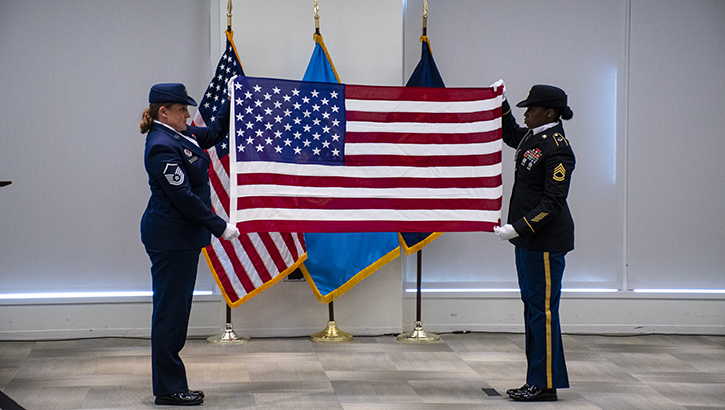The Defense Health Agency marked the 22nd anniversary of 9/11 with a remembrance ceremony at Defense Health Headquarters in Falls Church, Virginia, on Sept. 11, 2023.
The event featured a presentation from retired U.S. Army Col. (Dr.) James Geiling, who served as director of the DiLorenzo Pentagon Health Clinic on the day of the attacks.
In his opening remarks, Dr. Michael Malanoski, DHA’s deputy director, noted that because 22 years have passed since 9/11, for many, the event is historical rather than personal.
“Sometime today, take a little time to think about what this day means to you personally,” said Malanoski. “Think about what happened that day; that it can and will happen again; and how we will respond.”
As the doctor in charge of the Pentagon’s health clinic on 9/11, the events of the day were very personal for Geiling. He noted his team was well-served by careful preparation and readiness for attacks like the one on 9/11.
“I had a great team working there,” said Geiling, who is now an attending intensivist at the White River Junction Vermont Veterans Affairs Medical Center. “We practiced this, we rehearsed this, and they picked up the ball and ran with it.”
At the time, Geiling was working at the intensive care unit at Walter Reed Army Medical Center when the Pentagon was attacked. He made his way to the building despite road closures and other challenges. Once reunited with his team, they relied on their extensive mass casualty training. Geiling said, “We didn’t have to recreate the wheel, because there were past experiences from which there is data.”
Their training “looked at the Oklahoma City bombing (in 1995) and the U.S. embassy bombing in Kenya (in 1998). These provided important lessons learned that we were able to use in our preparation.”
They also prepared for the unique challenges of the Pentagon building. “This is the largest stand-alone office building in the world,” said Geiling. “Thirty-four acres and 70 miles of corridors.”
Staff trained by reviewing “basic life support,” said Geiling. “Lectures on triage and trauma … practice maneuvering around the field and working on our conversations.”
One exercise in May of 2001 proved to be foreshadowing. In the training scenario, staff responded to triage multiple injuries stemming from a large area of damage outside the building. “The reason was a 35-passenger commuter plane crashed into that side,” said Geiling. “We rehearsed, in part, what happened on 9/11.”
In the hours after the attack, staff treated multiple injuries including burns, eye injuries, and injuries from the collapsed building. Geiling said there was “an awful lot of hysteria, anxiety, and just a sense of helplessness.”
They had to deal with staff fatigue and burnout. It was difficult to reach their families. There were concerns about another attack. Yet, unexpected moments lifted their spirits.
“Around 2:30 in the morning, a Marine and a firefighter in a crane put a flag up on top of the building,” said Geiling. “I can tell you even with all the generators going on, and the water still spraying, the scene became eerily silent when that flag went up. It was just an unbelievably moving time that I reflect on today.”
Geiling continues to reflect on the events of 9/11.
“I purposely take the day to step away from work or other activities. I take time to focus on smelling the roses, especially appreciating family and friends who were with me during those challenging days.”
He finished with a note of gratitude to the DHA, “for what you guys are all doing at DHA to care for our Nation’s service men and women and their families. I’m especially proud to share with you in that really important mission.”


